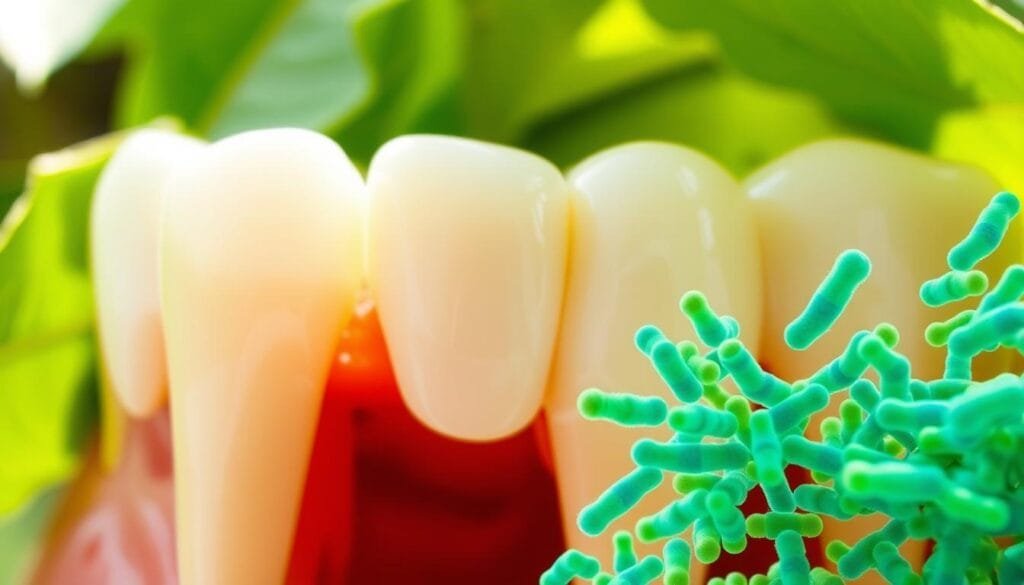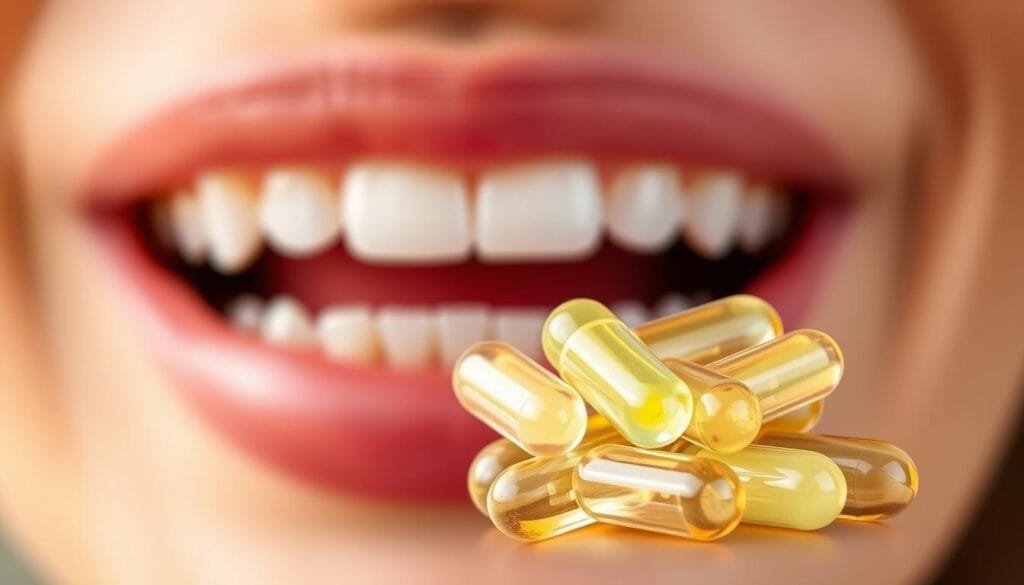Currently Empty: RM0.00
Nearly 60% of people report daily breath or gum issues at some point, a surprising figure that shows how common simple mouth concerns are.
This short article introduces how friendly microbes can support a balanced oral microbiome and practical steps people can try today.
Wellness Concept in Malaysia shares research-backed tips, noting strains like Lactobacillus reuteri and Streptococcus salivarius K12 that may help reduce plaque and ease gingivitis symptoms.
Probiotics come in foods such as yogurt and kefir, and in lozenges, rinses, or pills. They are meant to add to daily brushing and flossing, not replace routine dental care.
Readers will learn who may benefit and how to start safely. For quick guidance, Wellness Concept is available on WhatsApp at +60123822655 during business hours: Mon–Fri 9:30 am–6:30 pm, Sat 10 am–5 pm.
Key Takeaways
- Select strains have shown reductions in plaque and activity of harmful bacteria.
- Foods and supplements both offer routes; choose what fits daily routine.
- Use probiotics as a complement to brushing, flossing, and checkups.
- Discuss supplements with a clinician, especially for higher infection risk.
- Wellness Concept in Malaysia can help match options to lifestyle via WhatsApp.
Understanding probiotics and the oral microbiome
A balanced mouth ecosystem helps keep harmful microbes in check and supports daily oral comfort.
How beneficial bacteria shape a healthier mouth environment
The mouth hosts many types of bacteria that form a living community. When helpful strains dominate, they limit pathogens and lower plaque buildup.
Imbalance is often caused by dietary sugars, inconsistent hygiene, or illness. Introducing beneficial bacteria through fermented foods or targeted supplements can encourage steadier bacteria mouth balance.
Current research linking probiotics to plaque, cavities, and gum health
Small trials report that Lactobacillus reuteri may ease gingivitis and cut plaque. Streptococcus salivarius K12 has reduced odor-causing species after antimicrobial rinses.
These studies show modest benefits but more long-term research is needed. Prebiotics like raw garlic and chicory root may help probiotic growth.
Local support
For readers in Malaysia, Wellness Concept can answer quick questions on WhatsApp at +60123822655 during business hours: Mon–Fri 9:30 am–6:30 pm; Sat 10 am–5 pm; Sun Closed.

- Benefits often include modest plaque control and improved gum comfort.
- Choose fermented foods like yogurt or kimchi, or oral lozenges for convenience.
- Consult a clinician if a disease raises infection risk before starting supplements.
What is the role of probiotics in oral health?
Certain strains may tip the microbial balance so harmful bacteria lose their advantage. That shift helps lower cavity and tooth decay risk when daily brushing and flossing are kept up.
Balancing harmful and beneficial bacteria to lower cavity risk
Beneficial microbes compete with harmful bacteria and reduce acid production that erodes enamel. This creates an environment less friendly to mutans that drive plaque and cavities.
Targeting Streptococcus mutans to reduce plaque and tooth decay
Some strains directly inhibit streptococcus mutans by producing antimicrobial compounds. Reducing mutans can slow plaque formation and cut the pathway to tooth decay.
Gum health benefits and fresher breath
Lactobacillus reuteri and Lactobacillus brevis have been linked to lower inflammation and eased gingivitis symptoms. Streptococcus salivarius K12 can outcompete odor-causing species and help with bad breath.
Evidence-backed strains and what studies suggest
Common strains used: Lactobacillus reuteri, Streptococcus salivarius K12, Lactobacillus acidophilus, Bifidobacterium lactis BL04. Early studies show benefit, but long-term research and regulatory approval are still developing.

- Benefits vary by mouth environment, diet, and daily habits.
- Use probiotics as a complement — not a replacement — for routine care.
- For tailored advice in Malaysia, contact Wellness Concept via WhatsApp at +60123822655 during business hours, or read more on their probiotics guide.
How to add probiotics to your oral care routine in Malaysia
Practical steps make it easy to layer beneficial bacteria into a mouth care routine for stronger teeth and gums.
Daily habits that work with probiotics, not against them
Time an oral lozenge after brushing and flossing to let helpful strains settle. Limit sugary snacks and rinse with water after acidic meals to avoid feeding harmful bacteria.
Keep brushing twice a day, flossing once, and clean the tongue. These simple ways reduce plaque and make supplements or foods more effective.
Foods versus supplements and choosing strains for teeth and gums
Start with fermented foods like yogurt, kefir, kimchi, miso, and sauerkraut for gentle support. Oral-targeted lozenges and rinses can give focused help for gum comfort and bad breath.
| Option | Best for | Key strains | Notes |
|---|---|---|---|
| Fermented foods | Daily diet support | Mixed cultures | Look for “live and active cultures” |
| Oral lozenges/rinses | Breath & gum comfort | L. reuteri, S. salivarius K12 | Use after brushing for targeted action |
| Mixed supplements | Broader bacteria balance | L. acidophilus, B. lactis | Check strain labels and shelf life |
Smart safety considerations and when to consult a professional
If he or she has higher infection risk—immunocompromised, pregnant, very young, or elderly—consult a clinician first. Start low, monitor breath and gum comfort, and keep regular dental visits.
For Malaysia-specific product picks and quick recommendations, WhatsApp Wellness Concept at +60123822655 during business hours: Mon–Fri 9:30 am–6:30 pm; Sat 10 am–5 pm (Sun Closed).
Conclusion
Adding targeted supplements or fermented foods can nudge mouth bacteria toward healthier balance over time. This short article encourages small tests, tracking breath and gum comfort as measures of progress.
Evidence from studies and research shows select strains may ease gingival inflammation and cut odor-causing species after rinses. Results vary by person, routine, and diet, so expectations should stay realistic.
Safety matters: anyone with a disease affecting immunity, pregnant women, children, or seniors should seek advice before starting concentrated supplements. Use probiotics oral products alongside regular dental care, brushing, and flossing to help lower tooth decay and cavity risk.
For product help or local guidance in Malaysia, message Wellness Concept on WhatsApp at +60123822655 (Mon–Fri 9:30 am–6:30 pm; Sat 10 am–5 pm). Small, steady steps deliver the best long-term benefits.
FAQ
How do beneficial bacteria shape a healthier mouth environment?
They compete with harmful microbes for space and nutrients, lowering levels of pathogens linked to plaque, cavities, and gum inflammation. Beneficial strains also produce substances that inhibit bad bacteria and help maintain a balanced oral ecosystem.
Can targeting Streptococcus mutans reduce plaque and tooth decay?
Yes. Certain strains reduce Streptococcus mutans counts, which often cause cavities. Lower numbers of this species tend to mean less acid production and slower enamel breakdown, helping protect teeth from decay.
Do probiotics help reduce gum inflammation and gingivitis?
Some studies show probiotics can lower signs of gingivitis and swelling by shifting the microbial mix and calming the immune response. Results vary by strain and product, so effects may not appear for everyone.
Will probiotics improve breath freshness?
They can. Beneficial bacteria often outcompete odor-causing species, reducing volatile sulfur compounds that produce bad breath. Combining probiotics with good oral hygiene gives the best results.
Which strains have the most evidence for oral care?
Lactobacillus reuteri and Streptococcus salivarius K12/BM are frequently studied for their oral benefits. These strains have shown potential to reduce harmful bacteria and support gum and throat health.
What do current studies suggest and where is more research needed?
Research indicates promising benefits for plaque control, gum health, and breath, but long-term studies and standardized dosing are still limited. More trials are needed to confirm optimal strains and treatment lengths.
How can someone add probiotic support to a daily routine in Malaysia?
They can use probiotic lozenges, chewable tablets, or oral rinses containing proven strains, and include fermented foods like yogurt. Regular brushing, flossing, and dental checkups should continue alongside any supplements.
Should people choose foods or supplements for oral benefits?
Both work, but supplements with targeted oral strains offer more consistent results for teeth and gums. Fermented foods support overall microbiome health and can complement strain-specific products.
What safety tips should be considered and when to consult a professional?
Most healthy adults tolerate oral probiotics well, but immune-compromised individuals should consult a dentist or physician first. Check product labels for strain names and CFU counts, and stop use if irritation or adverse reactions occur.



